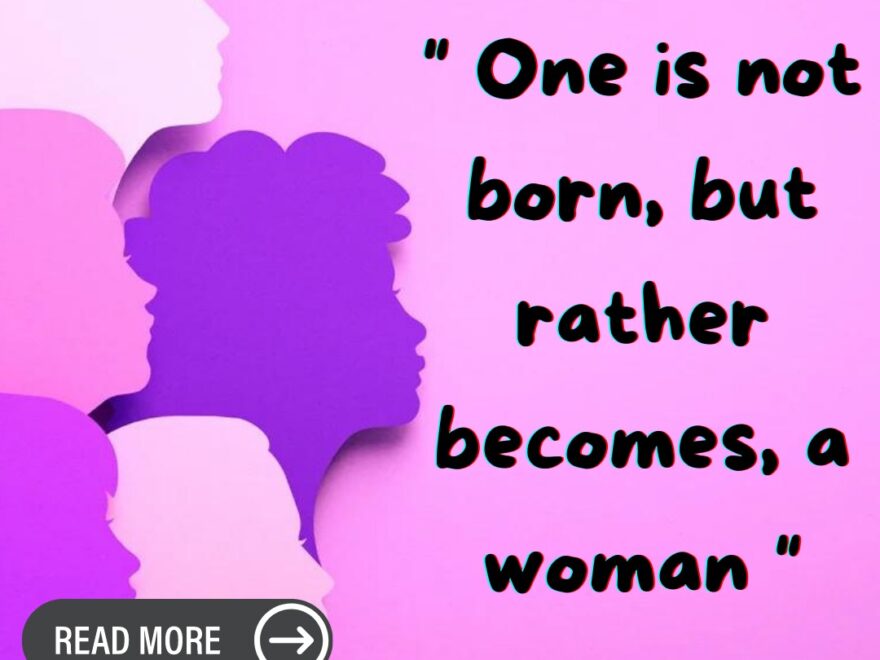Unveiling the Essence of Womanhood: A Journey of Identity and Expression
(Relevant for Essay Writing for UPSC Civil Services Examination)

Introduction
The statement “One is not born, but rather becomes, a woman” offers a profound reflection on the multifaceted nature of womanhood. Far beyond biology, this statement speaks to the intricate journey that individuals embark upon as they navigate the complexities of gender identity, societal expectations, and personal growth.
The Path to Womanhood: This statement encapsulates the notion that the process of becoming a woman is layered and influenced by various factors:
- Social and Cultural Influences: While biological sex is assigned at birth, the concept of womanhood is intricately woven with the cultural and societal norms surrounding femininity. These norms, often learned from a young age, shape how individuals perceive and embody their gender.
- Personal Identity and Expression: The journey of becoming a woman is deeply connected to personal identity and self-discovery. As individuals grow and learn about themselves, they develop a sense of what womanhood means to them, influenced by their feelings, experiences, and understanding of gender.
- Intersectionality: Womanhood is not a singular experience; it’s influenced by intersectionality—the merging of gender with other facets of identity like race, ethnicity, sexuality, and socio-economic background. These intersections contribute to diverse and distinct expressions of womanhood.
The Challenges and Empowerment: The statement also sheds light on both the challenges and empowerment encountered along this journey:
- Gender Expectations: Societal expectations of gender roles can be restrictive, pressuring individuals to conform to traditional norms of womanhood. This can lead to internal conflict as individuals reconcile these expectations with their evolving self-identities.
- Empowerment and Agency: On the other hand, the journey of becoming a woman presents opportunities for empowerment and self-empowerment. Individuals may choose to challenge limiting norms, forging a path toward authentic expressions of their womanhood.
Conclusion:
In conclusion, the statement “One is not born, but rather becomes, a woman” encapsulates the intricate and dynamic process of embracing womanhood. It underscores the pivotal role of societal influences, cultural contexts, personal experiences, and self-expression in shaping what it means to be a woman. This perspective invites us to embrace a more inclusive and evolving understanding of womanhood—one that recognizes it as a journey of growth, self-discovery, and empowerment that extends far beyond biology.
To master these intricacies and fare well in the Sociology Optional Syllabus, aspiring sociologists might benefit from guidance by the Best Sociology Optional Teacher and participation in the Best Sociology Optional Coaching. These avenues provide comprehensive assistance, ensuring a solid understanding of sociology’s diverse methodologies and techniques
womanhood, gender identity, womanhood, social influence, personal empowerment, self-discovery, gender norms, intersectionality, womanhood, gender identity, womanhood, social influence, personal empowerment, self-discovery, gender norms, intersectionality

Why Vikash Ranjan’s Classes for Sociology?
Proper guidance and assistance are required to learn the skill of interlinking current happenings with the conventional topics. VIKASH RANJAN SIR at TRIUMPH IAS guides students according to the Recent Trends of UPSC, making him the Best Sociology Teacher for Sociology Optional UPSC.
At Triumph IAS, the Best Sociology Optional Coaching platform, we not only provide the best study material and applied classes for Sociology for IAS but also conduct regular assignments and class tests to assess candidates’ writing skills and understanding of the subject.
Choose The Best Sociology Optional Teacher for IAS Preparation?
At the beginning of the journey for Civil Services Examination preparation, many students face a pivotal decision – selecting their optional subject. Questions such as “which optional subject is the best?” and “which optional subject is the most scoring?” frequently come to mind. Choosing the right optional subject, like choosing the best sociology optional teacher, is a subjective yet vital step that requires a thoughtful decision based on facts. A misstep in this crucial decision can indeed prove disastrous.
Ever since the exam pattern was revamped in 2013, the UPSC has eliminated the need for a second optional subject. Now, candidates have to choose only one optional subject for the UPSC Mains, which has two papers of 250 marks each. One of the compelling choices for many has been the sociology optional. However, it’s strongly advised to decide on your optional subject for mains well ahead of time to get sufficient time to complete the syllabus. After all, most students score similarly in General Studies Papers; it’s the score in the optional subject & essay that contributes significantly to the final selection.
“A sound strategy does not rely solely on the popular
Opinion of toppers or famous YouTubers cum teachers.”
It requires understanding one’s ability, interest, and the relevance of the subject, not just for the exam but also for life in general. Hence, when selecting the best sociology teacher, one must consider the usefulness of sociology optional coaching in General Studies, Essay, and Personality Test.
The choice of the optional subject should be based on objective criteria, such as the nature, scope, and size of the syllabus, uniformity and stability in the question pattern, relevance of the syllabic content in daily life in society, and the availability of study material and guidance. For example, choosing the best sociology optional coaching can ensure access to top-quality study materials and experienced teachers. Always remember, the approach of the UPSC optional subject differs from your academic studies of subjects. Therefore, before settling for sociology optional, you need to analyze the syllabus, previous years’ pattern, subject requirements (be it ideal, visionary, numerical, conceptual theoretical), and your comfort level with the subject.
This decision marks a critical point in your UPSC – CSE journey, potentially determining your success in a career in IAS/Civil Services. Therefore, it’s crucial to choose wisely, whether it’s the optional subject or the best sociology optional teacher. Always base your decision on accurate facts, and never let your emotional biases guide your choices. After all, the search for the best sociology optional coaching is about finding the perfect fit for your unique academic needs and aspirations.
To master these intricacies and fare well in the Sociology Optional Syllabus, aspiring sociologists might benefit from guidance by the Best Sociology Optional Teacher and participation in the Best Sociology Optional Coaching. These avenues provide comprehensive assistance, ensuring a solid understanding of sociology’s diverse methodologies and techniques. Sociology, Social theory, Best Sociology Optional Teacher, Best Sociology Optional Coaching, Sociology Optional Syllabus.
Best Sociology Optional Teacher, Sociology Syllabus, Sociology Optional, Sociology Optional Coaching, Best Sociology Optional Coaching, Best Sociology Teacher, Sociology Course, Sociology Teacher, Sociology Foundation, Sociology Foundation Course, Sociology Optional UPSC, Sociology for IAS,
Follow us :
🔎 https://www.instagram.com/triumphias
🔎https://www.youtube.com/c/TriumphIAS
https://t.me/VikashRanjanSociology
Find More Blogs
|
Scope of the subject and comparison with other social sciences |
|||
|
|
|
|
Modernity and social changes in Europe |

